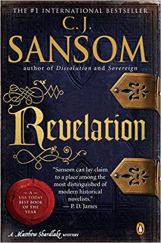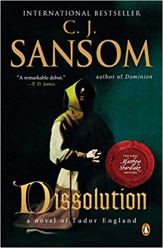
Pages: 351
Published: 2008
Revelation is the fourth book in the Matthew Shardlake series. The lawyer is drawn into the hunt for a serial killer when a friend is murdered in a particularly horrible way. As the hunt goes on it becomes clear that the murderer is not killing for political reasons or for personal gain, and the hunters can’t understand him at all. Most of them think he’s possessed, but Shardlake thinks he’s a madman. Shardlake thinks a lot about insanity, as he also encounters patients of the Bethlem (Bedlam) Hospital in this book.
Once again he’s entangled with powerful men, but this time they’re on the same side. Archbishop Cranmer has reasons for wanting to keep the investigation from the king and he thinks Shardlake is the ideal man for the job. The king’s brothers-in-law, Edward and Thomas Seymour, are also involved.
Thanks to a sympathetic portrayal of him by Bernard Hepton in the TV series The Six Wives of Henry VIII in 1970, I’ve always had a soft spot for Cranmer. Sansom portrays him as a compassionate and determined man, when he’s more often depicted as a weak man who gave way under pressure. There’s a particularly moving moment in the novel where Cranmer talks at length about the horror of being burned alive, a fate the real Cranmer eventually suffered.
The historical detail is, as always with Sansom, wonderful. There’s talk of setting up a hospital for the poor who have nowhere to go for care after the monasteries have been dissolved and the monks cast out. Shardlake and his assistant, Barak, make as much use of boats on the Thames as they do of their horses for moving around London. The streets are full of beggars and hawkers selling their wares.
Interestingly, Sansom only shows characters who have extreme religious beliefs. There are conservatives who want the English church to return to Rome and ‘hot-gospellers’ who are radical Protestants. There are even atheists. There are, however, no characters who show moderation and understanding in their beliefs. Perhaps that’s how things were at that time, but it feels odd.
My one criticism of Sansom would be that he’s not very good at action scenes. As in the previous three books there are moments when Shardlake’s life is in danger, but the reader barely has time to register the danger before it’s over.
As always, I can thoroughly recommend this episode in the Shardlake series.
April Munday is the author of the Soldiers of Fortune and Regency Spies series of novels, as well as standalone novels set in the fourteenth century.
Available now:



